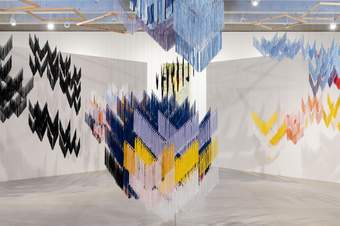
Installation view of Outi Pieski at Tate St Ives, 2024. Photo © Tate (Oliver Cowling)

Installation view of Outi Pieski at Tate St Ives, 2024. Photo © Tate (Oliver Cowling)
Tate today announced a new initiative dedicated to bringing more work by Indigenous artists into its collection. Building on the success of recent acquisitions and custodianship agreements, this strategy seeks to create a step-change in the number of contemporary artists from Indigenous communities around the world whose work is represented at Tate.
The programme launches with a four-year commitment from the AKO Foundation to fund acquisitions of Sámi and Inuit art from Northern Europe. This continues the AKO Foundation’s generous support of Tate over recent years, including for the exhibitions Olafur Eliasson (2019), the Turner Prize (2021) and Surrealism Beyond Borders (2022), as well as a programme of events at Tate Modern to coincide with the UN Climate Change Conference COP26 in 2021.
Similar projects to research, collect and display the work of artists from other Indigenous communities will follow, including in South Asia, Oceania and the Americas. These will strengthen the work of Tate’s existing acquisition committees in these regions and further Tate’s commitment to championing art in all its diversity.
Karin Hindsbo, Director of Tate Modern, said “We are beginning to see greater recognition of Indigenous contemporary artists around the world, as this year’s Venice Biennale demonstrates so brilliantly. Tate has long been dedicated to expanding the canon of art history and we can now take that work even further. I’m particularly delighted that Sámi and Inuit artists from Northern Europe – an area of artistic practice very close to my heart – will soon be represented in Tate’s ever-more-diverse international collection for the first time.”
The first works to be acquired through the new fund will be Outi Pieski’s woven hanging installation Guržot ja guovssat / Spell on You! 2020 and its companion piece Skábmavuođđu / Spell on Me! 2024 created during her residency at Porthmeor Studios in Cornwall. The artist has described how the laborious act of weaving these installations “references ritual, sacrifice, redress, atonement, and the contradictory forces in Sámi societies.”
This will mark the first time a Sámi artist has entered the collection, coinciding with Pieski’s acclaimed exhibition at Tate St Ives (open until 6 May 2024) where the works are currently on display. On 28 April 2024 the artist will join a panel discussion at Tate Modern alongside Maree Clarke (Boon Wurrung, Mutti Mutti, Wamba Wamba, Yorta Yorta First Nations peoples, Australia) to discuss Indigenous contemporary practice and its relationship to the regeneration of land and culture.
Today’s announcement reflects the growing commitment to Indigenous artists at Tate. Key works by artists from a range of communities have entered the collection in recent years, including Shuvinai Ashoona (Inuit, Canada), Abel Rodríguez (Nonuya, Colombia) and Edgar Calel (Maya Kaqchikel, Guatemala). An innovative joint-acquisition programme with MCA Australia, supported by a gift from the Qantas Foundation, transformed Tate’s ability to represent Aboriginal and Torres Strait Islanders art, as seen in Tate Modern’s recent exhibition A Year in Art: Australia 1992 and the month-long display of Embassy by Richard Bell (Kamilaroi, Kooma, Jiman and Goreng Goreng peoples, Australia). In 2025 Tate Modern will stage the first large-scale Emily Kam Kngwarray exhibition ever held in Europe, organised in close collaboration with the National Gallery of Australia.
Beyond its galleries, Tate has also driven important research and scholarship in this field, particularly through the work of the Hyundai Tate Research Centre: Transnational. The post of Adjunct Curator of Indigenous Art was established by the Centre in 2019, held first by Pablo José Ramírez and now by Kimberley Moulton (First Nations Australia, Yorta Yorta peoples). This role works alongside Tate’s network of adjunct curators around the world to bring new perspectives on global art histories to the fore.